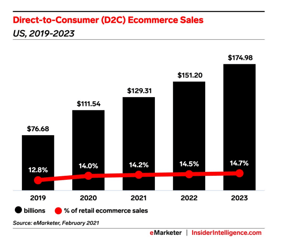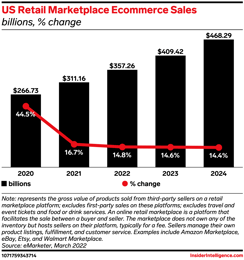Balancing DTC eCommerce: Websites & Marketplaces
DTC (Direct-to-Consumer) eCommerce refers to a business model where companies sell their products or services directly to consumers through online channels such as their website, social media, marketplaces, or mobile applications. This approach eliminates the need for intermediaries such as wholesalers or retailers. Due to advancements in technology and changing consumer behavior, DTC eCommerce has become increasingly popular in recent years, and is expected to continue to grow in sales, as seen in the graph to the right. This model has enabled companies to offer personalized experiences, faster delivery, and competitive pricing, resulting in higher customer satisfaction and loyalty.
services directly to consumers through online channels such as their website, social media, marketplaces, or mobile applications. This approach eliminates the need for intermediaries such as wholesalers or retailers. Due to advancements in technology and changing consumer behavior, DTC eCommerce has become increasingly popular in recent years, and is expected to continue to grow in sales, as seen in the graph to the right. This model has enabled companies to offer personalized experiences, faster delivery, and competitive pricing, resulting in higher customer satisfaction and loyalty.
Website vs. Marketplace eCommerce
DTC website eCommerce refers to a business model where companies build and utilize their own website to sell their products to customers. Website eCommerce provides a company with much more flexibility than marketplaces do. Utilizing a website instead of a marketplace gives companies the ability to customize their layout to fit their specific needs, typically for lower fees than a marketplace model. Additionally, with a website model brands are able to have complete control over their brand image, whereas on marketplaces there are regulations in place to standardize the customer experience across all sellers. Building a direct relationship with consumers is also important, specifically the ability to capture customer email addresses for future communications, cross-selling, and advertising. While website eCommerce does provide sellers with some benefits, it also limits brands in a few ways. Compared to marketplaces, website eCommerce gives brands a more limited customer base and time and money will need to be invested in order to reach new buyers. Another drawback of website eCommerce is that compared to marketplaces, it is more difficult to build trust and credibility with potential customers because the brand is not backed by a larger, trusted company like Amazon, Alibaba, or others.
 On the other hand, DTC marketplace eCommerce refers to a business model where companies provide an online platform for third-party sellers to sell their products or services directly to customers such as Amazon, eBay, and Alibaba. Many consumers begin in this model. The marketplace acts as a platform for sellers to list their products, manage inventory, process payments, and handle shipping and returns. In exchange, the marketplace charges a commission or fees for each transaction. This eCommerce model has also become increasingly popular in recent years due to the convenience and variety it offers to customers, as seen in the graph to the left.
On the other hand, DTC marketplace eCommerce refers to a business model where companies provide an online platform for third-party sellers to sell their products or services directly to customers such as Amazon, eBay, and Alibaba. Many consumers begin in this model. The marketplace acts as a platform for sellers to list their products, manage inventory, process payments, and handle shipping and returns. In exchange, the marketplace charges a commission or fees for each transaction. This eCommerce model has also become increasingly popular in recent years due to the convenience and variety it offers to customers, as seen in the graph to the left.
Why is Using Both DTC Websites and Marketplaces Important?
Having a diversified approach in the retail industry is vital to reaching new customers and building your brand. Balancing DTC website and marketplace eCommerce can be a challenge, but by creating a seamless customer experience and monitoring performance regularly, companies can effectively reach and engage with customers across multiple channels. Below are some tips and tricks for brands to balance a multi-channel approach:
- Identify the Target Audience: Companies should understand their target audience and where they prefer to shop. Some customers prefer to shop on marketplaces like Amazon or eBay, while others prefer to purchase directly from the company's website. By understanding customer behavior, companies can tailor their approach to reach the right audience on the right channel effectively.
- Leverage Each Channel’s Strengths: DTC websites give a brand full control over the customer experience, while marketplace eCommerce provides access to a broader audience and existing customer base. Marketplaces have robust fulfillment and warehouse solutions. By leveraging these varying strengths, companies can create a seamless shopping experience, whether a customer purchases directly from the company or through a marketplace.
- Customer Data Ownership: Owning the customer relationship - and data - is key to future cross selling, targeting ads, and providing personalized experiences. By collecting and analyzing customer data, DTC eCommerce companies can personalize the customer experience to match individual preferences and behavior. They can also use this data to create targeted marketing campaigns that are more likely to resonate with their audience. Lastly, customer data ownership ensures that sensitive customer information is protected and not misused by third-party companies, fostering a sense of trust with the customer.
- Maintain Consistent Branding: Regardless of the channel, it is important to maintain consistent branding across all touch-points. This includes visual elements like logos, colors, and messaging, as well as the overall customer experience. Maintaining a consistent brand across channels will help you build a strong brand identity and allow you to become more recognizable to potential buyers.
- Monitor Brand Performance: Companies should monitor the performance of both website and marketplace eCommerce channels regularly. This includes tracking metrics like customer acquisition costs, conversion rates, and customer lifetime value. This data can help companies optimize their approach and make informed decisions about how to further diversify their channels in the future.
Multichannel branding is essential in eCommerce to reach a broader audience, maintain consistency, optimize the customer experience, and mitigate risk. By leveraging multiple channels and creating a seamless customer journey, companies can increase brand awareness, improve customer loyalty, and drive business growth.
More About aiCommerce
aiCommerce is a global digital marketing agency with a focus on retail and eCommerce marketplaces. aiCommerce is primed with decades of digital marketing experience and backed by our 90-day grow and know guarantee, we can help your brand grow across eCommerce channels to gain brand awareness and increase sales. Now is the perfect time to utilize our eCommerce experts to help grow your business. Click the button below to qualify for a free listing consult from aiCommerce to jumpstart your eCommerce growth!




